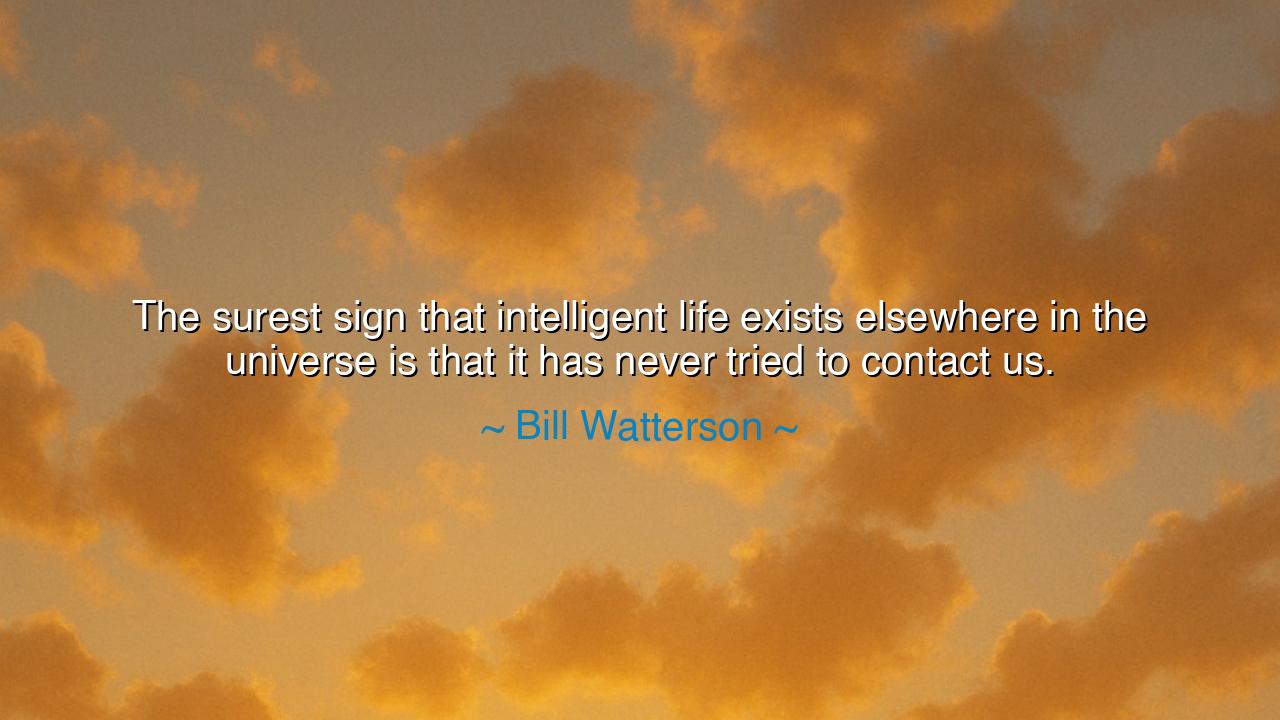
The surest sign that intelligent life exists elsewhere in the
The surest sign that intelligent life exists elsewhere in the universe is that it has never tried to contact us.






“The surest sign that intelligent life exists elsewhere in the universe is that it has never tried to contact us.” — Thus quipped Bill Watterson, the creator of Calvin and Hobbes, a man whose humor was as profound as it was playful. Beneath the laughter of this remark lies a truth both humbling and haunting — a mirror held up to the nature of humanity itself. For in this jest about alien intelligence, Watterson quietly reveals his doubt not about the existence of wisdom among the stars, but about the wisdom of man upon the earth.
In his words, there is both irony and lament. The universe, vast and ancient, may indeed harbor countless forms of intelligent life — yet, if such beings exist, they have chosen silence over contact. Why? Because perhaps they have observed us from afar and found us unworthy of fellowship. For though we call ourselves civilized, our history is a chronicle of folly and violence, of endless striving and self-destruction. Watterson’s humor, like that of a philosopher cloaked in laughter, invites us to look inward: if intelligence does not seek us, perhaps it is because we have not yet proven ourselves intelligent enough to be sought.
Throughout the ages, humankind has gazed at the heavens in awe, imagining gods, angels, and celestial kin. We built telescopes, sent signals into space, and launched golden records aboard our machines, carrying music, mathematics, and greetings into the void. Yet even as we dream of cosmic companionship, we remain divided here below. We speak of peace, but make war; we speak of progress, but destroy the earth that sustains us. If other beings observe us, perhaps they see not a race of wisdom, but of contradiction — brilliant in invention, yet childish in restraint.
Consider the tale of Oppenheimer and the atom, that fire of the gods which man wrested from nature. With his genius, he unveiled a power that could have illuminated the world — but it was used to burn cities instead. In that moment, the measure of our intelligence was tested, and our failure was revealed. What would the stars think of such a species — one that can map the heavens, yet cannot govern its own heart? Watterson’s jest cuts deep: the silence of the cosmos may not be mystery, but mercy.
Yet his words are not despairing. Beneath their irony lies a quiet hope — that by recognizing our folly, we might one day transcend it. For humor, in the hands of the wise, is not mockery but medicine. Watterson’s quote awakens humility, reminding us that true intelligence is not the accumulation of knowledge, but the awakening of conscience. To be worthy of contact — whether with alien life or the divine within ourselves — we must learn to live wisely, with compassion, restraint, and reverence for life.
The ancients knew this truth in their own way. Socrates declared that the beginning of wisdom is to know that one knows nothing. Lao Tzu taught that mastery of others is strength, but mastery of oneself is true power. So too, Watterson reminds us that intellect without wisdom leads not to enlightenment, but to isolation. If the cosmos remains silent, it may be because higher beings understand what we have yet to learn — that knowledge untempered by humility becomes danger, and power ungoverned by virtue becomes madness.
The lesson, then, is this: before we seek to speak with other worlds, we must learn to listen within our own. Before we call into the void for other intelligences, we must become truly intelligent ourselves — not in our inventions, but in our understanding of one another. Let us end the wars of greed and ignorance; let us tend the fragile earth with care; let us show, by our actions, that wisdom still walks among men. For only then, perhaps, will the silence of the stars break — not out of pity, but out of recognition.
So remember the teaching of Bill Watterson, disguised in jest but rich in truth: “The surest sign that intelligent life exists elsewhere in the universe is that it has never tried to contact us.” Take it as both a warning and a call to awakening. Let us strive to become a species worthy of being found — not by those among the stars, but by the better angels of our own nature. For when mankind learns to live with wisdom, the universe itself will answer — not with words, but with welcome.






AAdministratorAdministrator
Welcome, honored guests. Please leave a comment, we will respond soon